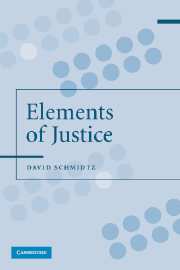Book contents
- Frontmatter
- Contents
- Acknowledgments
- PART 1 WHAT IS JUSTICE?
- PART 2 HOW TO DESERVE
- PART 3 HOW TO RECIPROCATE
- 13 Reciprocity
- 14 What Is Reciprocity?
- 15 Varieties of Reciprocity
- 16 Debts to Society and Double Counting
- 17 The Limits of Reciprocity
- PART 4 EQUAL RESPECT AND EQUAL SHARES
- PART 5 MEDITATIONS ON NEED
- PART 6 THE RIGHT TO DISTRIBUTE
- References
- Index
14 - What Is Reciprocity?
Published online by Cambridge University Press: 05 June 2012
- Frontmatter
- Contents
- Acknowledgments
- PART 1 WHAT IS JUSTICE?
- PART 2 HOW TO DESERVE
- PART 3 HOW TO RECIPROCATE
- 13 Reciprocity
- 14 What Is Reciprocity?
- 15 Varieties of Reciprocity
- 16 Debts to Society and Double Counting
- 17 The Limits of Reciprocity
- PART 4 EQUAL RESPECT AND EQUAL SHARES
- PART 5 MEDITATIONS ON NEED
- PART 6 THE RIGHT TO DISTRIBUTE
- References
- Index
Summary
Thesis: Principles of reciprocity can play important roles in a pluralistic theory of justice.
RECIPROCITY, DESERT, SELF-RESPECT
Lawrence Becker, in a wonderful, neglected book, calls reciprocity a disposition “to return good in proportion to the good we receive, and to make reparation for the harm we have done. Moreover, reciprocity is a fundamental virtue. Its requirements have presumptive authority over many competing considerations.” The disposition is ubiquitous. “Gifts and goods pervade our lives. So do evils and injuries. Everywhere, in every society of record, there is a norm of reciprocity about such things.”
The details differ strikingly from place to place, time to time, and every society is profuse with forms. There are rituals of gift-giving, unspoken understandings between lovers, patterns of family life, expectations among friends, duties of fair play, obligations of citizenship, contracts – all understood as reciprocal. There is an intricate etiquette for it all, and it is connected (both in theory and in practice) to prudence, self-interest, altruism, basic human needs, social welfare, notions of desert and duty, justice, and fairness.
Reciprocity concerns how we should respond when someone has done us a favor. To Becker, reciprocity so understood is “fundamental to the very concept of justice.” Formulated as a principle, the idea might be:
When you can, return good in proportion to the good you receive.
- Type
- Chapter
- Information
- The Elements of Justice , pp. 75 - 81Publisher: Cambridge University PressPrint publication year: 2006



